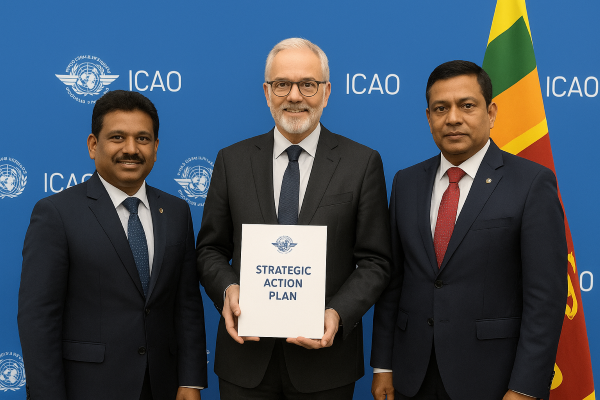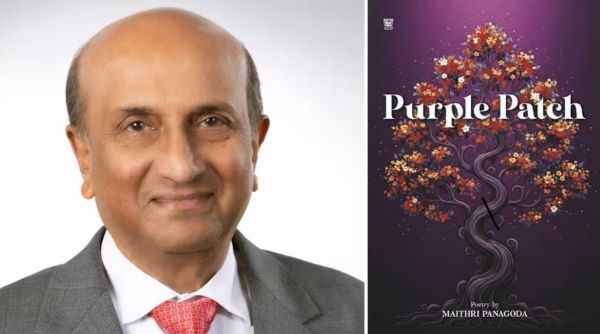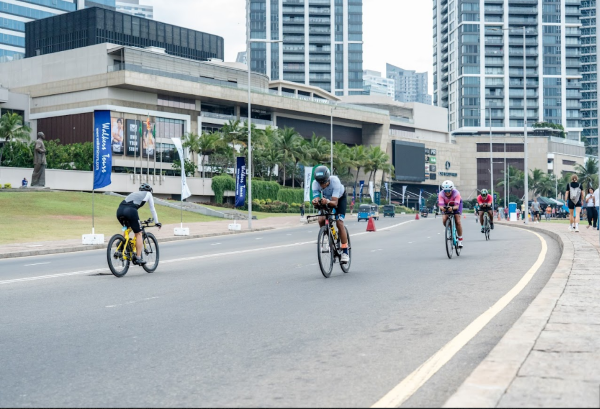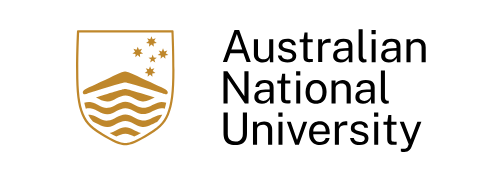Thorathuru SLA Newsletter – October 2025
Sri Lanka Association of NSW (SLA) Inc.
Sri Lanka Association acknowledges and pays respect to the past, present, and future Traditional Custodians and Elders of this nation and the continuation of cultural, spiritual, and educational
practices of Aboriginal and Torres Strait Islander peoples
In this issue
● A Message from the President
● Welcome event for the High Commissioner
● Kukulegama Project
● SLA Winter Ball
● SLA Luncheon with Dr Harsha de Silva
● A Strategic renewal to empower the community
● AGM Notice 26 October 2025
● AGM nomination rules and form
● Proposal to amend membership fees
● Proposal to change the current postal address
● Proposal to form Sub Organisations (special purpose)
● Why study the “balance of power” theory?
Note from Editor
I extend my gratitude to all members for trusting me as the editor of the SLA in 2024-2025. I enjoyed the journey and the opportunity to contribute to the SLA in a small way. I wish the next elected committee all the success.
Lucky, Dr. Lakshman Randeniya
The contents in this newsletter are submissions of the respective authors and do not necessarily represent the views of the SLA
A Message from the President
It gives me great pleasure to extend my heartfelt thanks and appreciation for the continued support and encouragement given to me and to my committee during my term as President for 2024–2025.
It has truly been an honour and a privilege to receive your collaboration in supporting our association’s functions and get-togethers over the years. Your contributions have played a vital role in strengthening the cultural and community ties among Sri Lankans in Australia.
The members of the Sri Lanka Association have consistently participated in our events, both past and present, helping us celebrate the rich culture and traditions of Sri Lanka. These collective efforts have brought Sri Lankans together, reinforcing our connection to both our heritage and the wider Australian community.
I would also like to take this opportunity to extend my sincere appreciation to the dedicated committee members who have worked tirelessly alongside me throughout this journey. Your commitment, teamwork, and generosity have been invaluable in achieving our shared goals.
Wishing you all continued success, happiness, and prosperity in the years ahead.
Warm regards,
Anoja De Alwis
President, 2024–2025
Welcome Event for the High Commissioner for Sri Lanka to Australia
The Sri Lankan Association (SLA) organised a warm and heartfelt welcome event for the newly appointed High Commissioner for Sri Lanka to Australia, Her Excellency Ms. Yasoja Gunasekera, and her staff on Sunday, 15th June 2025, at the Thornleigh Community Centre, Sydney.
Over 125 members of the Sri Lankan community gathered to mark this special occasion, which symbolised unity, shared purpose, and a renewed commitment to strengthening the bonds between Sri Lanka and Australia.
Her Excellency was accompanied by her distinguished team from the High Commission in Canberra — Mr. U.G.C. Abeyrathne (Minister), Captain Lanka Dissanayake (Counsellor – Defence), and Mr. Manoj Amarasinghe (Consular Officer).
The event highlighted the continued spirit of collaboration within the Sri Lankan community in Australia and reaffirmed the shared vision of fostering friendship, cultural exchange, and cooperation between the two nations.
Reported by: Duke Ramachandran
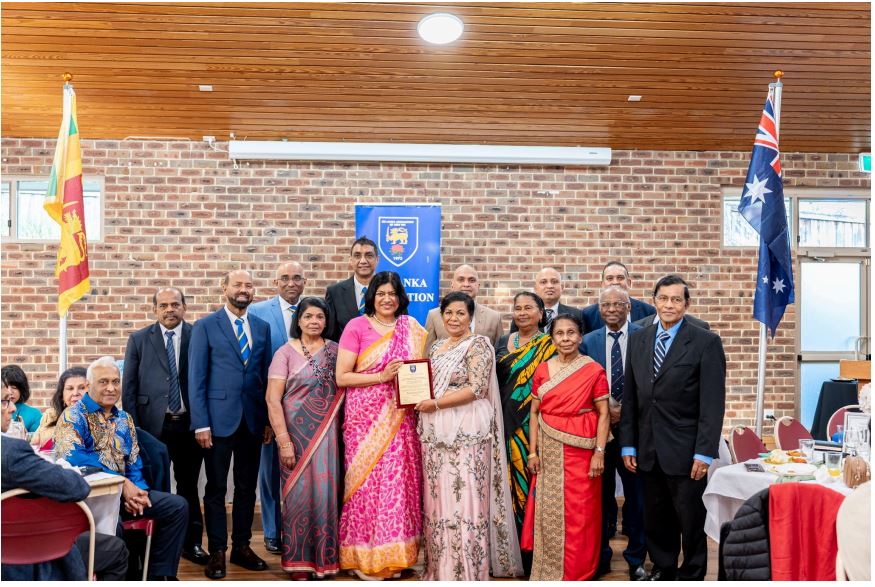 SLA executive committee members with Her Excellency Yasoja Gunasekera and staff
SLA executive committee members with Her Excellency Yasoja Gunasekera and staff
The High Commissioner’s address set the tone for the day—one of collaboration, respect, and shared responsibility.
She called on the diaspora to remain engaged and united in their support of Sri Lanka, while acknowledging the strong community spirit present in Sydney.
A key highlight of the event was the proposal to establish a Sri Lanka–Australia Business Forum, signalling a new era of economic collaboration and opportunity.
Adding a delightful surprise to the program was Kishani Jayasinghe-Wijayasekara, acclaimed international commercial lawyer and opera singer, who moved the audience with a powerful rendition of “You Raise Me Up.”
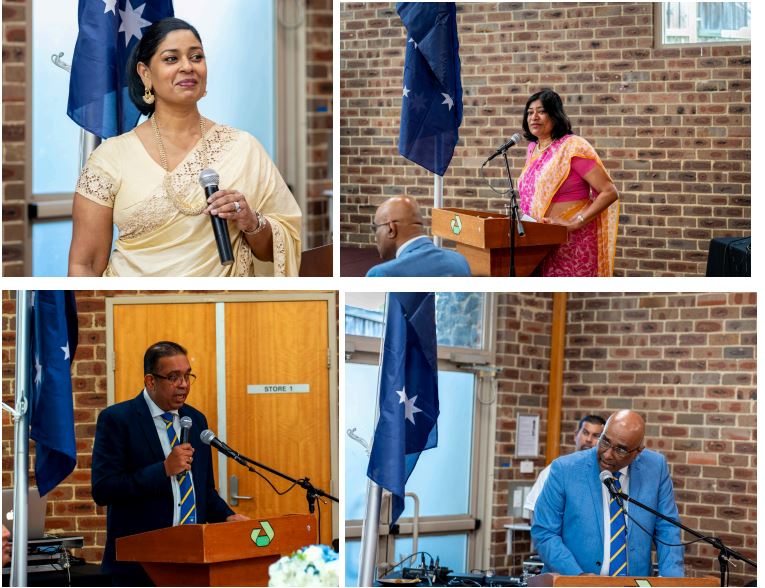
Presentations from the renowned opera singer Kishani, Her Excellency Yasoja Gunasekera, MC Duke Ramachandran, and the Secretary for SLA, Don Ravi Iddamalgoda
The Q&A session, moderated by MC Duke Ramachandran, allowed guests to raise pressing issues—particularly concerns regarding the limited consular services in Sydney, such as passport renewals and dual citizenship processing.
In response to this, the Sinhalese Cultural Forum of NSW promptly announced the commencement of a Consular Mobile Service, held on Saturday, 26th July 2025, at their Seven Hills headquarters.
The event concluded with a delicious Sri Lankan meal catered by Ceylonia Restaurant, courtesy of Indika Alwis.
The Kukulegama Students Project – Empowering Rural Education in Sri Lanka
The Kukulegama Students Project, held on 13 July 2025 at Kamburawela Maha Vidyalaya, marked a significant milestone in supporting education for underprivileged students in rural Sri Lanka.
This humanitarian initiative was the vision of former President Sam Masachchi, who served from 2016 to 2018, and was entirely funded by the Sri Lankan community in Australia. The current committee allocated approximately LKR 1.2 million to complete the project successfully.
The event took place in Katuhena New Village, an economically challenged community in the Kukuleganga area. Essential school items were distributed to 158 students representing six local schools, all of whom were from families experiencing financial hardship.
Each student received a school supply pack valued at Rs. 8,000, including essential educational materials. Morning tea and lunch were also provided for all the children, generously funded by Sri Lanka Association (SLA) members through their personal contributions.
The event was organized and coordinated by Colonel R.M.H. Jayathissa, former General Manager of Kukuleganga Laya Leisure Resort, who handled all groundwork and logistical arrangements.
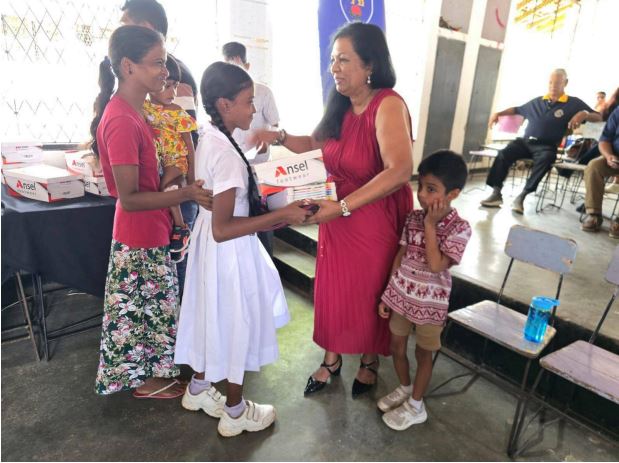
Children receiving the school items from SLA President, Anoja de Alwis,
Dignitaries Present
-
Mr. Patrick Kaluarachchi – President, Lions Club of Wattala
-
Lion Mrs. Ione Algama – Lions Club of Wattala
-
Members of the Wattala Lions Club
-
Members of the Sri Lanka Association of NSW
-
Mr. Sydney – Principal, Kaburawala College
-
Mr. Sisira – Former Principal, Morapitiya Weediye Bandara College
-
Brigadier Asanka Perera – General Manager, Kukuleganga Laya Leisure Army Holiday Resort
Mr. Shantha Perera – Former Chief Engineer of the Kukuleganga Power Station and the current Head of the Ratnapura Power Station.
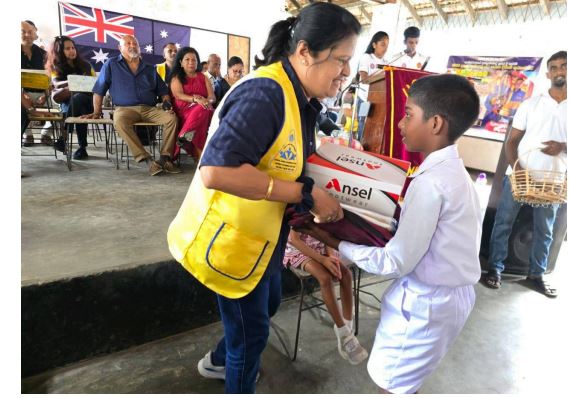
Special Recognition – Kavindu Madushan
A highlight of the event was the recognition of Kavindu Madushan, a remarkable young athlete whose journey stands as an inspiration to many. Kavindu began his education at Kamburawela Maha Vidyalaya and later attended C.W.W. Kannangara Central College, where his dedication to sports flourished.
His hard work and determination led him to achieve international acclaim, winning a silver medal at the Cross-Country Championship held in Islamabad, Pakistan, on February 2nd, 2025.
In appreciation of his outstanding achievement and to encourage his continued success, the Sri Lanka Association of NSW proudly presented Kavindu Madushan with a special support package during the event.
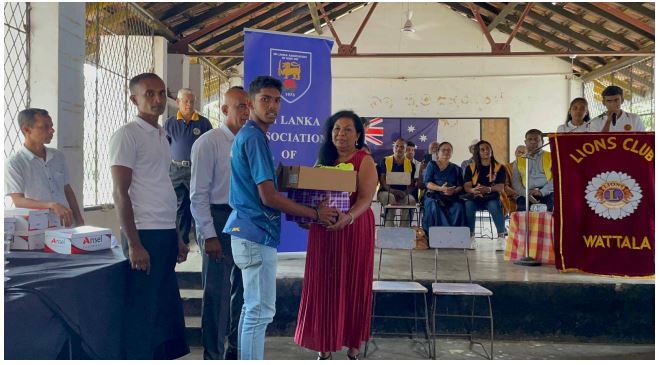
Special recognition of Madushan, an athlete who has had remarkable achievements in the Asian sports arena.
SLA Winter Ball 2025
The Sri Lanka Association’s much-anticipated Annual Winter Ball 2025 took place on Saturday, 9th August, at the iconic Epping Club—a venue deeply cherished by the Sydney Sri Lankan community.
The evening was a magnificent celebration of culture, camaraderie, and elegance, uniting members and friends for a night filled with fine dining, music, and dancing. Guests were greeted with warmth and sophistication as they entered the beautifully adorned ballroom, which set the perfect tone for an unforgettable evening of laughter, entertainment, and friendship.
A heartfelt thank you goes out to the organising committee, led by President Anoja De Alwis, for their unwavering dedication and inspiring vision in making the event a grand success.
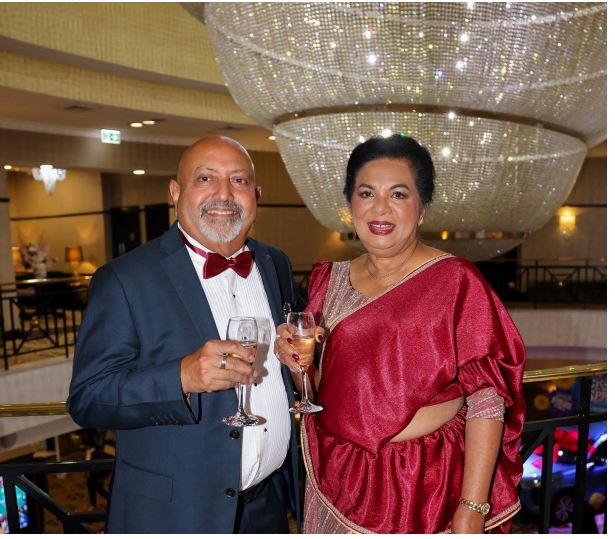
President Anoja and Niranjan are raising a toast
Special appreciation is extended to our main sponsor, SriLankan Airlines, for their generous contribution of two return tickets to Colombo for the evening’s raffle draw. Our sincere thanks also go to Thuva and Karen from Cuvai, Sydney’s newest and most talked-about restaurant, for presenting dining vouchers that delighted our lucky winners.
We are deeply grateful to the many reputed businesses and individuals who sponsored the event magazine, and to our team of volunteers whose tireless efforts ensured the evening ran seamlessly. Their collective commitment and enthusiasm truly made the SLA Winter Ball 2025 an evening to remember.
Entertainment was truly a highlight of the evening. Melbourne band, Majesty, kept the dance floor alive, joined by guest vocalist Sureen from Sydney, who had the crowd singing along to her powerful renditions of popular hits. Post-dinner, the stage lit up with the dazzling energy of drag entertainer Dixie, who had many enthusiastic guests donning wigs and joining in the fun on the dance floor.
Memories of the night were beautifully captured by none other than Roy Grafix, ensuring that the spirit of the evening will be remembered for years to come.
The evening marked a truly spectacular night that lived up to the rich tradition of the Winter Ball. The Sri Lanka Association looks forward to welcoming members and friends to many more events in the year ahead, continuing its tradition of fostering unity and celebrating our rich cultural ties.
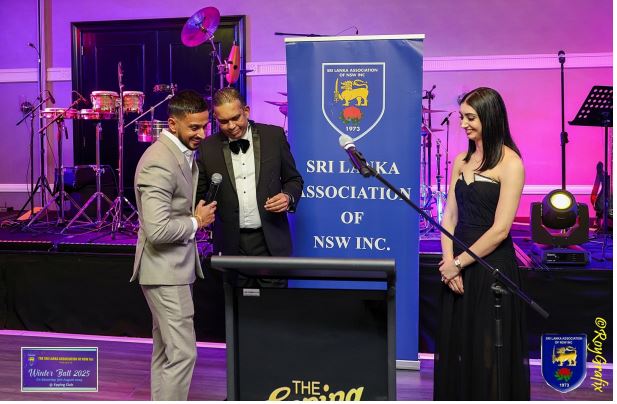
MC Duke with sponsors of the event Thuva and Karen from Cuvai, Sydney’s newest restaurant
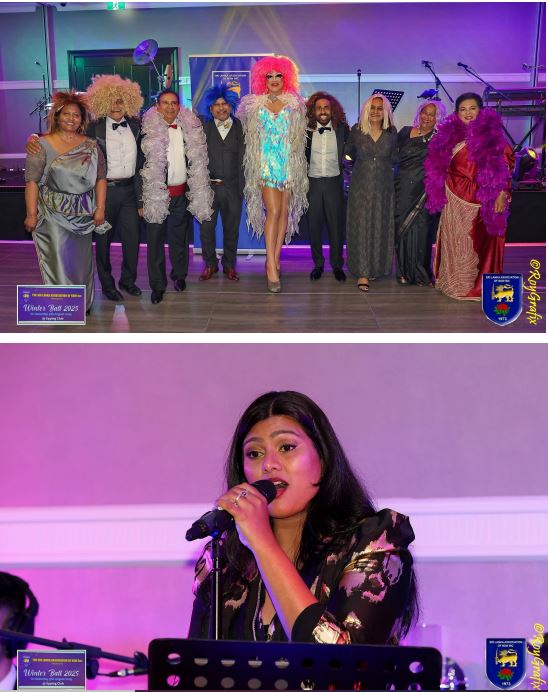
SLA Luncheon with Dr. Harsha de Silva – A Dialogue on Sri Lanka’s Future
Sri Lankan Parliamentarian Dr. Harsha de Silva met with a group of around 20 Sri Lankan expatriates in Sydney on the sidelines of the FoodWISE Asia-Pacific Regional Meeting on Food and Water Security held at the University of Technology Sydney (UTS).
The luncheon meeting, hosted at Kandy Bites by Chef Ceylon in Glebe and organised by the Sri Lanka Association of NSW (SLA), provided a platform for open dialogue on the key challenges and opportunities currently facing Sri Lanka.
Attendees appreciated the opportunity to engage directly with Dr. de Silva on topics relating to the nation’s economic outlook, development priorities, and potential avenues for collaboration between Sri Lankans at home and abroad.
Guests were also treated to a sumptuous traditional Sri Lankan meal, adding a warm touch of home to an afternoon filled with meaningful conversation and community spirit.
SLA Luncheon with Dr. Harsha de Silva – A Dialogue on Sri Lanka’s Future
Sri Lankan Parliamentarian Dr. Harsha de Silva met with a group of around 20 Sri Lankan expatriates in Sydney on the sidelines of the FoodWISE Asia-Pacific Regional Meeting on Food and Water Security, held at the University of Technology Sydney (UTS).
The luncheon meeting, hosted at Kandy Bites by Chef Ceylon in Glebe and organised by the Sri Lanka Association of NSW (SLA), brought together community members for an open exchange on the key challenges and opportunities facing Sri Lanka. Guests also enjoyed a sumptuous traditional Sri Lankan meal, adding warmth and flavour to an afternoon of insightful conversation.
During the discussion, Dr. de Silva outlined the objectives of the FoodWISE conference, which brings together policymakers, researchers, and practitioners from across the Asia-Pacific to share best practices in strengthening food and water security. He emphasised the importance of scaling up such initiatives and establishing a regional FoodWISE network to foster ongoing collaboration and knowledge sharing.
The open dialogue also addressed issues of particular importance to Sri Lanka, including the impact of climate change on water and food security, challenges in agriculture, infrastructure development needs, and the adoption of new technologies to enhance soil fertility, manage water shortages, and boost key exports such as tea.
The event provided an opportunity for constructive engagement between Sri Lankan professionals in Australia and a national policymaker, reaffirming the shared commitment to Sri Lanka’s progress through informed dialogue and international collaboration.
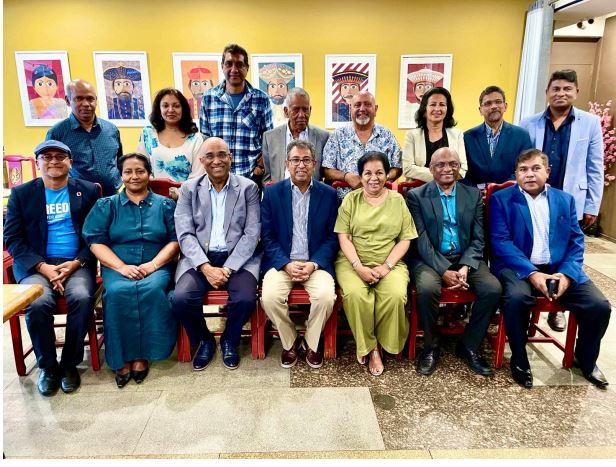
Speaking at the meeting, Dr. de Silva said: “Sri Lanka must encourage forward-thinking policies and new approaches if we are to sustain growth of close to 9% and ensure long-term economic prosperity. I intend to inspire our political system to think outside the box and deliver the reforms needed for a
stronger future.”
The event provided a meaningful opportunity to strengthen ties between expatriates and their homeland while highlighting Sri Lanka’s priorities in food security, sustainable development, and economic growth.
Strategic Renewal to Empower Community
Celebrating 50 Years While Bridging Generations and Strengthening Diaspora Ties
By Don Ravi Iddamalgoda, Secretary 2024–25
The Sri Lankan Association NSW (SLANSW), the peak body representing the Sri Lankan diaspora in New South Wales and a key liaison with both state and federal governments as well as the Sri Lankan Consulate General, has embarked on a major strategic review aimed at revitalizing its mission and strengthening its impact for the next generation.
Marking its 50th anniversary, the Association acknowledges a proud history of serving the community but recognizes the urgent need for renewal. With an average member age steadily increasing, the current leadership is committed to creating pathways for younger Sri Lankans to engage, participate, and lead — ensuring that SLANSW remains a vibrant, inclusive, and future-ready organisation.
The new strategic plan focuses on three key pillars: Youth Engagement, Cultural Continuity, and Community Empowerment. Through targeted initiatives such as leadership mentoring programs, intergenerational networking forums, and digital community platforms, SLANSW aims to bridge the gap between long-standing members and emerging youth leaders.
“Renewal doesn’t mean forgetting the past; it means building on it with vision and purpose,” said SLANSW President, who emphasized the importance of adapting to the evolving needs of a diverse and dynamic diaspora community.
The Association also plans to strengthen collaboration with professional and student networks, religious and cultural groups, and Australian institutions to ensure the Sri Lankan voice continues to be heard and respected across all levels of society.
A commemorative 50th Anniversary Gala will be held later this year, celebrating the Association’s journey and honouring the pioneers who laid its foundation in the 1970s. The event will also serve as a launchpad for the next chapter — a modernized SLANSW that reflects the aspirations of a new generation of Australians of Sri Lankan heritage.
As SLANSW moves forward, its commitment remains clear: to preserve cultural heritage, foster unity, and empower the community to thrive — today, tomorrow, and for the next 50 years.
nearing 60 and a declining rate of new memberships, SLANSW is seeking to redefine its value proposition to engage younger members better and remain relevant to evolving community needs.
Community Concerns Take Centre Stage
Central to the review are concerns voiced by the community, including the call for a dedicated diaspora consulate, addressing domestic and family violence, improving mental health awareness, tackling the housing crisis, and providing greater support for new migrants, senior citizens, and job security.
The Association also aims to expand its focus on social wellbeing, tackling issues such as loneliness, supporting men’s groups, and encouraging early childhood development programs.
Current and Past Initiatives
SLANSW continues to organize hallmark events that bring the community together — including Independence Day celebrations, the Winter Ball, Vesak and Sinhala–Tamil New Year festivities. These events not only celebrate cultural pride but also nurture connection and belonging.
In addition, SLANSW supports charitable donations to Sri Lanka, conducts blood donation drives, and provides ongoing assistance to seniors and young achievers. Past initiatives have included scholarships for students in Sri Lanka, youth leadership programs, and even planning for a retirement village — all testament to the Association’s enduring commitment to serve.
As SLANSW embarks on its next chapter, this strategic renewal represents a bold step forward — ensuring that the Association remains an active, inclusive, and forward-thinking platform that bridges generations and strengthens the Sri Lankan identity in Australia for decades to come.
Collaboration and Growth Opportunities
The review identified significant opportunities for collaboration with organizations such as the Sydney Consular Forum, local Sinhala schools, and seniors’ associations. The Consulate General of Sri Lanka expressed a strong interest in deepening business ties, promoting Sri Lankan exports, sharing technology and intellectual property, and attracting investment capital into key sectors.
Strengths, Weaknesses, Opportunities, and Threats (SWOT)
A candid SWOT analysis revealed SLANSW’s core strengths — including a solid constitution, a professional and diverse membership, sound financial standing, and an inclusive ethos.
However, several challenges were acknowledged, such as an aging membership base, limited unity, political divisions, and outdated communication methods.
On the positive side, there are numerous opportunities to rejuvenate the association — including launching a Sri Lanka–Australia Business Chamber, mentoring new migrants, supporting mental and family wellbeing, and fostering engagement through modern digital platforms like WhatsApp and social media.
Potential threats include racism, social disharmony, housing affordability pressures, and the emergence of competing organizations within the community.
Looking Forward: Harnessing Collective Potential
Many Sri Lankans continue to make remarkable contributions in both Australia and Sri Lanka — often independently and without coordinated support. SLANSW’s renewed strategy aims to bring these individual efforts together under one umbrella, strengthening collaboration and community spirit.
By uniting the diaspora, embracing innovation, and leveraging federal and community partnerships, SLANSW seeks to evolve into a dynamic, galvanizing force that uplifts Sri Lanka while enriching the lives of Sri Lankans in New South Wales.belonging in Australia.
A Call for Collective Renewal
As SLANSW embarks on this transformative journey, it warmly invites all members—particularly the younger generation—and those with skills, experience, and a passion for community service to play an active role in shaping a vibrant and inclusive future for the Sri Lankan diaspora in New South Wales.
AGM Notices
In addition to the general AGM procedures, three key amendments to the Constitution are being proposed for member consideration:
-
Proposed Amendment to Constitution: Section 10 – Fees, Subscriptions, etc.
Revision to ensure clarity and relevance in financial procedures. -
Amendment to Appendix 1 and Appendix 3
To update the postal address to:
PO Box 114, Castle Hill, NSW 1765 -
Proposal to Form Sub-Organisations for Special-Purpose Projects
To enable greater focus, innovation, and participation in specific community development initiatives.
Members are encouraged to review the documentation provided and lend their support to these forward-looking proposals, which will be presented at this year’s AGM.
The current Executive Committee extends its sincere appreciation to all members and well-wishers who have supported SLANSW throughout the past year. Your continued commitment has been vital in advancing the association’s goals.
Note from the Editor
I wish to express my heartfelt gratitude to all members for placing their trust in me as the Editor for 2024–2025. It has been a truly rewarding experience to contribute, in a small way, to the continued growth and vibrancy of the SLA.
Wishing the next elected committee every success in carrying the torch forward.
— Dr. Lakshman Randeniya (Lucky)
AGM notice and documents
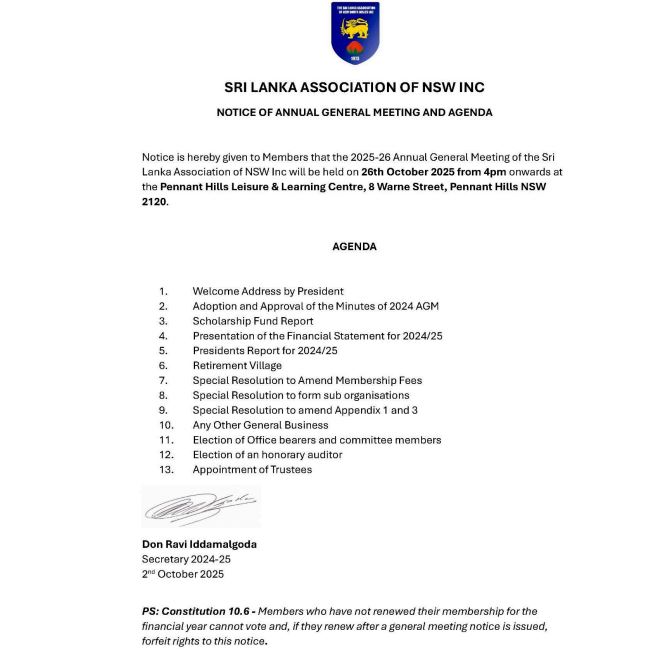
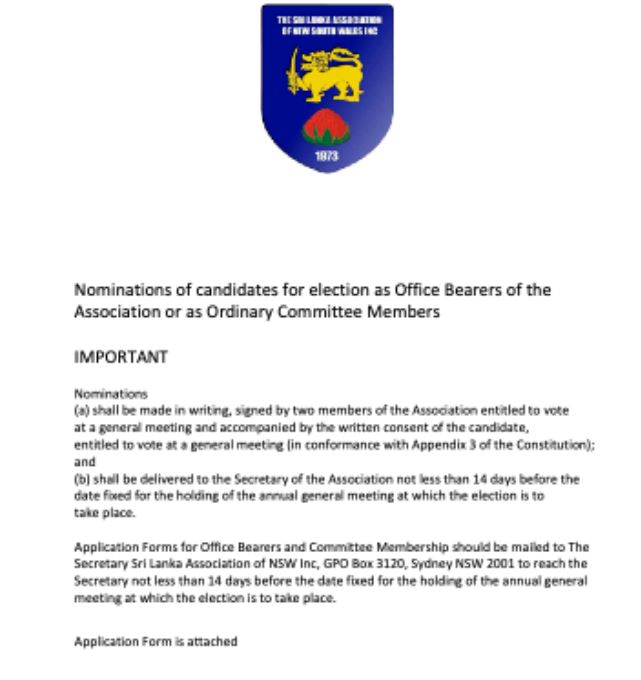
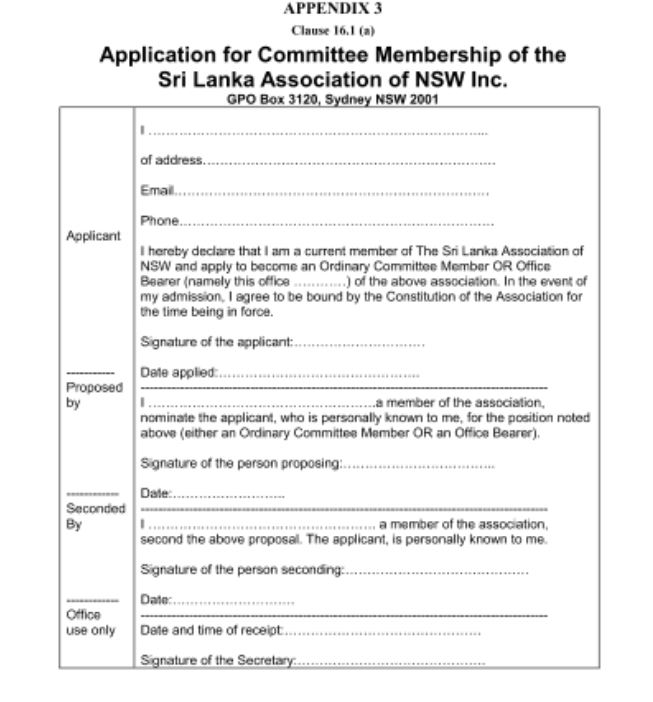
Special Resolution to Amend Membership Fees
Proposed Amendment to Constitution: Section 10 — Fee, Subscriptions, etc.
Special Resolution:
Pursuant to the requirements of the Association’s Constitution, it is proposed that the following amendments be made to Section 10 — Fee, Subscriptions, etc.:
-
Clause 10.2(a) – Life Membership (per individual)
The membership fee shall be amended from One Hundred and Fifty Dollars ($150.00) to Two Hundred Dollars ($200.00). -
Clause 10.2(b) – Annual Family Membership (per couple)
The annual membership subscription shall be amended from Twenty Dollars ($20.00) to One Hundred Dollars ($100.00). -
Clause 10.2(c) – Annual Single Membership
The annual membership subscription shall be amended from Ten Dollars ($10.00) to Fifty Dollars ($50.00). -
Clause 10.2(d) – Annual Student Membership
This clause shall be removed. -
Clause 10.2(e) – Annual Student Family Membership
This clause shall be removed.
These amendments shall take effect immediately upon the passing of this Special Resolution at a duly convened General Meeting of the Association.
Submitted by:
Don Ravi Iddamalgoda
Secretary, 2024–2025
Special Resolution to Amend Appendix 1 and Appendix 3
Proposed Amendment to Constitution
Special Resolution:
That Appendix 1 and Appendix 3 of the Constitution be amended to replace the old postal address with the current postal address:
PO Box 114, Castle Hill, NSW 1765
These amendments shall take effect immediately upon the passing of this Special Resolution at a duly convened General Meeting of the Association.
Don Ravi Iddamalgoda
Secretary 2024–25
Special Resolution to Form Sub-Organisations
Preamble:
In accordance with the Constitution of the Sri Lanka Association of NSW Inc. (hereinafter referred to as “the Association”), and with the intent of expanding the Association’s outreach, cultural initiatives, and community engagement through structured sub-units, it is proposed that the Association formally adopt a mechanism to establish and regulate sub-organisations.
This resolution defines the governance framework, obligations, and procedures for the establishment, operation, and termination of such sub-organisations, ensuring alignment with the strategic objectives and core values of the Association.
Resolution
1. Authority to Establish Sub-Organisations:
The Association shall have the authority to establish sub-organisations by issuing a Charter, in accordance with this Constitution and subject to the approval of a duly convened General Meeting of the Association.
2. Eligibility and Application Process:
A group of persons who are current members, or eligible to become members of the Association, may apply to form a sub-organisation.
Each application must include:
-
A proposed Charter and Constitution of the sub-organisation.
The Association shall conduct appropriate due diligence — including an assessment of cultural relevance, strategic alignment, and operational feasibility — prior to approval.
3. Charter Issuance and Scope:
Upon approval, the Association Committee shall issue a formal Charter specifying:
-
The official name of the sub-organisation (reflecting its affiliation with the Association)
-
Its operational boundaries
-
Its defined purpose, objectives, and activities
4. Structure and Governance of Sub-Organisations:
Each sub-organisation shall establish an Executive Committee comprising:
-
President / Chairperson
-
Secretary
-
Treasurer
-
(Optional) Vice-President(s)
All Executive Members must be current financial members of the Association.
5. Obligations of Sub-Organisations:
All sub-organisations must:
-
Acknowledge and comply with the Constitution, policies, and directives of the Association.
-
Operate in alignment with the vision, mission, and values of the Association.
-
Submit annual returns (including audited financial statements and an activity report) to the Association by 30 September each year.
-
Appoint an independent auditor and present audited statements at their own AGM.
-
Obtain prior written consent from the Association for any property dealings exceeding $5,000.
6. Meetings and Voting:
-
Sub-organisation executives shall meet as required to conduct their affairs effectively.
-
General meetings may be convened as necessary.
-
Decisions shall be made by majority vote.
-
The presiding officer shall have a casting vote in the event of a tie.
7. Trustees of Sub-Organisations:
Each sub-organisation shall elect two Trustees, both of whom must be members of the Association, to hold property on behalf of the sub-organisation.
Trustees shall be appointed by the President of the sub-organisation, following a resolution passed at a general meeting of that sub-organisation.
8. Termination of Sub-Organisations:
A sub-organisation may be dissolved by a Special Resolution of its members, with its Charter returned to the Association.
The Association Committee retains the right to suspend or remove executives, or terminate a sub-organisation, in cases of non-compliance, misconduct, or actions contrary to the objectives of the Association.
Proposed by:
Don Ravi Iddamalgoda
Secretary (2024–2025)
Why study the “Balance of Power” theory? By Kithsiri Senadeera
When you hear the phrase “balance of power,” it probably sounds like something only politicians or academics worry about. But in reality, it’s a really useful idea for understanding how countries deal with each other, why conflicts happen, and how peace is sometimes kept.
The main objective of this article is to provide a theoretical framework for understanding the balance of power theory, which is useful to comprehend international relations among nations and their relevance to the contemporary international system. With interconnectedness fostered by globalisation we are affected by events happening in other parts of the world thousands of miles away. That’s why Therefore, we should be aware of international relationships, interactions, and interdependencies that exist among various nations in the international sphere. This topic intersects with History, Economics, Political Science, Sociology, and other disciplines, offering a rich, interdisciplinary perspective that encourages critical thinking and comprehensive understanding. Studying the balance of power provides invaluable insights into the evolution of modern political and economic systems, ensuring that future generations can learn from the lessons of the past. It helps us understand the interplay between power, diplomacy, and governance in shaping the modern world. As long as international politics is influenced by a nation-based state, the balance of power theory will continue to be a fundamental principle. This Balance of
Power theory has been pivotal in shaping the foreign policies of nations for centuries and remains a cornerstone in understanding global politics today. So it is better to be aware of the balance of power theory, which is an important concept in a deeper understanding of the complexities of global politics.
In Sri Lanka, most people don’t really think about the balance of power or international relations at all. Many of us are highly skilled in our own professions—medicine, engineering, IT, science—but we don’t often look beyond our fields. On the other hand, those who study the arts or social sciences rarely engage in science and technology. That lack of cross-disciplinary or Interdisciplinary thinking limits our perspective. In Australia, for example, I have seen medical and science students taking courses in Anthropology, Ancient History, or even Egyptology. This kind of learning builds creativity, problem-solving skills, and helps people understand the bigger picture of how societies function. Unfortunately, our own education system has been slow to change. It’s still largely shaped by old colonial structures and has not embraced a truly holistic approach.
The current Education Minister has spoken about reforms and the need for holistic development, but the idea of combining disciplines hasn’t been emphasized enough. This is something we should be encouraging because it would prepare future generations to understand not only their professions but also the world they live in.
What is Balance of Power?
The balance of power is one of the oldest and most fundamental concepts in international relations theory. Although there are many variations of the balance of power theory and interpretations of the concept, all are premised on the recurrent equilibrium model. According to this model, imbalances and concentrations in military and material capabilities among the great powers are checked, and
the equilibrium is restored. At its core, this concept suggests that international stability is most effectively maintained when power is distributed in such a way that no single state or alliance is strong
enough to dominate all others. This distribution of military, economic, and diplomatic capabilities among nations creates a system of checks and balances that theoretically prevents hegemony
(the dominance of one state over others), and promotes security for all participants in the international system. The theory operates under the assumption that the international system is anarchic,
meaning there is no overarching authority to enforce rules or provide security. In such a world, states must rely on themselves and their alliances to maintain equilibrium and avoid being
overpowered.
The basic idea of the balance of power is pretty simple: no one country (or group of countries) should be powerful enough to dominate all the others. When power is more evenly spread out, countries are forced to negotiate, form alliances, and compromise, rather than just bullying their way through. Think of it as a kind of “global checks and balances.”
This concept isn’t new. Way back in ancient Greece, city-states (polis) would team up to stop any single ‘polis’ from becoming toopowerful. The same principle continues today, only with modern
tools like nuclear weapons, trade agreements, and diplomatic summits. But the balance of power isn’t always clear-cut. Scholars have debated what it really means for centuries. It has been defined differently by International Relations scholars. “The trouble with Balance of Power is not that it has no meaning, but that it has too many meanings.”—Innis L. Claude Jr. Some say it’s a system, others call it a strategy, and sometimes leaders even use it as propaganda to justify their actions. For example, the U.S. publicly accused China of creating COVID-19 as a way of reshaping the global order—whether true or not, that accusation itself was tied to balance of power politics.
At the end of the day, studying the balance of power isn’t just about politics—it’s about understanding how the world works. It helps explain why nations act the way they do, why alliances form, and
why conflicts sometimes break out. For Sri Lankans especially, being more aware of these ideas could help us think beyond our own little “wells” and engage more meaningfully with global issues. In short: balance of power might sound like a theory, but it’s actually about everyday reality—and it’s worth paying attention to.
To be continued




